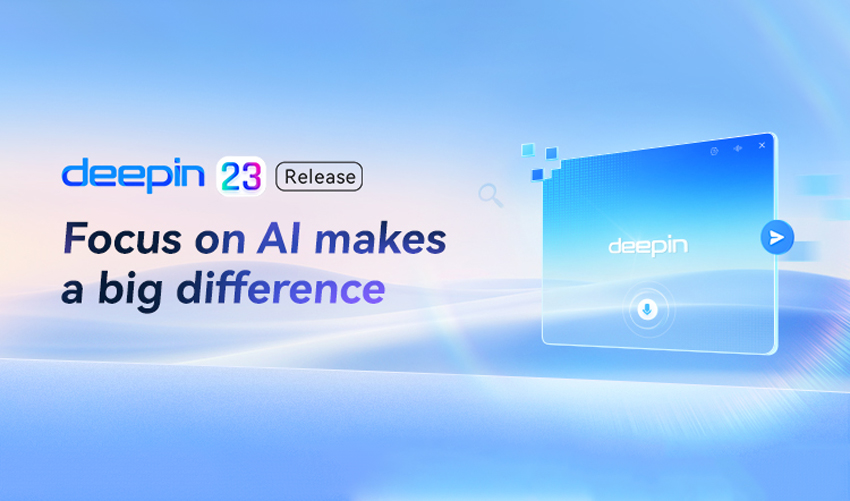Linux 6.12 To Optionally Display A QR Code During Kernel Panics
Posted: 2024-08-30 19:26:00 Source: https://linux.slashdot.org/story/24/08/30/1856206/linux-612-to-optionally-display-a-qr-code-during-kernel-panics?utm_source=atom1.0mainlinkanon&utm_medium=feed
New submitter meisdug writes: A new feature has been submitted for inclusion in Linux 6.12, allowing the display of a QR code when a kernel panic occurs using the DRM Panic handler. This QR code can capture detailed error information that is often missed in traditional text-based panic messages, making it more user-friendly. The feature, written in Rust, is optional and can be enabled via a specific build switch. This implementation follows similar ideas from other operating systems and earlier discussions in the Linux community.
Read more of this story at Slashdot.
How to install CentOS Stream 9 20240819
Posted: 2024-08-30 14:05:54 Source: https://www.youtube.com/watch?v=X-v9aez5EvQ
next-20240830: linux-next
Posted: 2024-08-30 06:27:24 Source: https://www.kernel.org/
| Version: | next-20240830 (linux-next) |
|---|---|
| Released: | 2024-08-30 |
EmuDeck Enters the Mini PC Market With Linux-Powered 'EmuDeck Machines'
Posted: 2024-08-29 22:50:00 Source: https://hardware.slashdot.org/story/24/08/29/221245/emudeck-enters-the-mini-pc-market-with-linux-powered-emudeck-machines?utm_source=atom1.0mainlinkanon&utm_medium=feed
An anonymous reader quotes a report from overkill.wtf: The team behind popular emulation tool EmuDeck is today announcing something rather special: they've spent the first half of 2024 working on their very first hardware product, called the EmuDeck Machine, and it's due to arrive before the year is out. This EmuDeck Machine is an upcoming, crowdfunded, retro emulation mini PC running Bazzite, a Linux-based system similar to SteamOS. [...] This new EmuDeck Machine comes in two variants, the EM1 running an Intel N97 APU, and the EM2 -- based on an AMD Ryzen 8600G. While both machines are meant as emulation-first devices, the AMD-based variant can easily function as a console-like PC. This is also thanks to some custom work done by the team: "We've optimized the system for maximum power. The default configuration of an 8600G gets you 32 FPS in Cyberpunk; we've managed to reach 47 FPS with a completely stable system, or 60FPS if you use FSR." Both machines will ship with a Gamesir Nova Lite controller and EmuDeck preinstalled naturally. The team has also preinstalled all available Decky plugins. But that's not all: if the campaign is successful, the EmuDeck team will also work on a docking station for the EM2 that will upgrade the graphics to an AMD Radeon 7600 desktop GPU. With this, in games like Cyberpunk 2077, you'll be able to reach 160 FPS in 1080p as per EmuDeck's measurements. You can preorder the EmuDeck Machines via Indigogo, starting at $322 and shipping in December.
Read more of this story at Slashdot.
Distribution Release: Ubuntu 24.04.1
Posted: 2024-08-29 20:36:58 Source: https://distrowatch.com/12223
The DistroWatch news feed is brought to you by TUXEDO COMPUTERS. Canonical has announced the availability of a minor update to the Ubuntu 24.04 LTS series. The 24.04.1 update features fixes for the year 2038 bug on ARM devices along with updates to the kernel, systemd, and there is now an official upgrade path from Ubuntu 23.10 to 24.04.1.....
Unlocking Linux Networking: Essential Insights on TCP/IP, DNS, DHCP, and Routing
Posted: 2024-08-29 16:00:00 Source: https://www.linuxjournal.com/content/unlocking-linux-networking-essential-insights-tcpip-dns-dhcp-and-routing

Introduction
Networking is a fundamental aspect of modern computing, underpinning everything from small home offices to large enterprise data centers. For Linux system administrators and network engineers, a strong grasp of networking principles and practices is essential to manage and troubleshoot complex network systems effectively. This guide delves into the core components of Linux networking: TCP/IP, DNS, DHCP, and routing, offering detailed insights and practical examples to enhance your understanding and skills.
TCP/IP Fundamentals
Definition and ImportanceTCP/IP, or Transmission Control Protocol/Internet Protocol, is the backbone of the internet and most private networks. It provides a set of rules that enable computers to communicate over long distances and different networks. Understanding TCP/IP is crucial for any networking professional as it lays the foundation for understanding how data moves across the network.
TCP/IP ComponentsThe TCP/IP model comprises four layers, each with specific protocols and functions:
- Link Layer: This layer handles protocols related to the physical network hardware, such as Ethernet.
- Internet Layer: The core layer where the Internet Protocol (IP) operates, handling packet routing across network boundaries.
- Transport Layer: Here, TCP and UDP (User Datagram Protocol) ensure data is transmitted reliably (TCP) or quickly (UDP).
- Application Layer: It includes protocols used by applications to communicate over the network, like HTTP, FTP, and SMTP.
Linux offers various tools and files for configuring and managing TCP/IP settings:
6.10.7: stable
Posted: 2024-08-29 15:37:22 Source: https://www.kernel.org/
| Version: | 6.10.7 (stable) |
|---|---|
| Released: | 2024-08-29 |
| Source: | linux-6.10.7.tar.xz |
| PGP Signature: | linux-6.10.7.tar.sign |
| Patch: | full (incremental) |
| ChangeLog: | ChangeLog-6.10.7 |
6.6.48: longterm
Posted: 2024-08-29 15:34:24 Source: https://www.kernel.org/
| Version: | 6.6.48 (longterm) |
|---|---|
| Released: | 2024-08-29 |
| Source: | linux-6.6.48.tar.xz |
| PGP Signature: | linux-6.6.48.tar.sign |
| Patch: | full (incremental) |
| ChangeLog: | ChangeLog-6.6.48 |
6.1.107: longterm
Posted: 2024-08-29 15:32:00 Source: https://www.kernel.org/
| Version: | 6.1.107 (longterm) |
|---|---|
| Released: | 2024-08-29 |
| Source: | linux-6.1.107.tar.xz |
| PGP Signature: | linux-6.1.107.tar.sign |
| Patch: | full (incremental) |
| ChangeLog: | ChangeLog-6.1.107 |
Linux Basics: Understanding the time Command for New Users
Posted: 2024-08-29 15:00:20 Source: https://www.youtube.com/watch?v=M6PYckCJcLw
Distribution Release: PorteuX 1.6
Posted: 2024-08-29 14:21:48 Source: https://distrowatch.com/12222
The DistroWatch news feed is brought to you by TUXEDO COMPUTERS. PorteuX is a Linux distribution based on Slackware Linux, inspired by Slax and Porteus. The project's latest release is version 1.6 which updates KDE Plasma to version 6 and provides minor updates to other, supported desktops. This release also includes an updated NVIDIA driver. "Improved Cinnamon application menu....
next-20240829: linux-next
Posted: 2024-08-29 07:23:48 Source: https://www.kernel.org/
| Version: | next-20240829 (linux-next) |
|---|---|
| Released: | 2024-08-29 |
'Uncertainty' Drives LinkedIn To Migrate From CentOS To Azure Linux
Posted: 2024-08-29 02:02:00 Source: https://linux.slashdot.org/story/24/08/28/2345255/uncertainty-drives-linkedin-to-migrate-from-centos-to-azure-linux?utm_source=atom1.0mainlinkanon&utm_medium=feed
The Register's Liam Proven reports: Microsoft's in-house professional networking site is moving to Microsoft's in-house Linux. This could mean that big changes are coming for the former CBL-Mariner distro. Ievgen Priadka's post on the LinkedIn Engineering blog, titled Navigating the transition: adopting Azure Linux as LinkedIn's operating system, is the visible sign of what we suspect has been a massive internal engineering effort. It describes some of the changes needed to migrate what the post calls "most of our fleet" from the end-of-life CentOS 7 to Microsoft Azure Linux -- the distro that grew out of and replaced its previous internal distro, CBL-Mariner. This is an important stage in a long process. Microsoft acquired LinkedIn way back in 2016. Even so, as recently as the end of last year, we reported that a move to Azure had been abandoned, which came a few months after it laid off almost 700 LinkedIn staff -- the majority in R&D. The blog post is over 3,500 words long, so there's quite a lot to chew on -- and we're certain that this has been passed through and approved by numerous marketing and management people and scoured of any potentially embarrassing admissions. Some interesting nuggets remain, though. We enjoyed the modest comment that: "However, with the shift to CentOS Stream, users felt uncertain about the project's direction and the timeline for updates. This uncertainty created some concerns about the reliability and support of CentOS as an operating system." [...] There are some interesting technical details in the post too. It seems LinkedIn is running on XFS -- also the RHEL default file system, of course -- with the notable exception of Hadoop, and so the Azure Linux team had to add XFS support. Some CentOS and actual RHEL is still used in there somewhere. That fits perfectly with using any of the RHELatives. However, the post also mentions that the team developed a tool to aid with deploying via MaaS, which it explicitly defines as Metal as a Service. MaaS is a Canonical service, although it does support other distros -- so as well as CentOS, there may have been some Ubuntu in the LinkedIn stack as well. Some details hint at what we suspect were probably major deployment headaches. [...] Some of the other information covers things the teams did not do, which is equally informative. [...]
Read more of this story at Slashdot.
Linux Market Share Hits New High
Posted: 2024-08-28 16:52:16 Source: http://www.linux-magazine.com/Online/News/Linux-Market-Share-Hits-New-High
For the first time, the Linux market share has reached a new high for desktops, and the trend looks like it will continue.
Kernel Errors & Wont Post Fixes for Multiple A800s and RTX 5880s
Posted: 2024-08-28 16:00:24 Source: https://www.youtube.com/watch?v=OsTOQSOlPt8
CentOS Stream 9 20240819 overview | Community-driven base platform for free software
Posted: 2024-08-28 10:24:27 Source: https://www.youtube.com/watch?v=5YBMRlU9kn0
next-20240828: linux-next
Posted: 2024-08-28 07:20:56 Source: https://www.kernel.org/
| Version: | next-20240828 (linux-next) |
|---|---|
| Released: | 2024-08-28 |
Distribution Release: 4MLinux 46.0
Posted: 2024-08-27 18:10:54 Source: https://distrowatch.com/12221
The DistroWatch news feed is brought to you by TUXEDO COMPUTERS. 4MLinux is a small Linux distribution with four areas of focus: system maintenance, multimedia, server, and games. The project's latest release is version 46.0 which no longer features a stand-alone Server edition. "As always, the new major release has some new features. The 4MLinux Server is now available....
Linux Distribution deepin 23 Officially Released
Posted: 2024-08-27 16:00:00 Source: https://www.linuxjournal.com/content/linux-distribution-deepin-23-officially-released

Introduction
"We don't consider simply adding or removing a few upstream applications, modifying the language, wallpaper, or adjusting the application layout to be a genuine version update of an operating system. We aspire that every major version update contains a wealth of features truly needed by users and innovative content to push the boundaries of what a Linux desktop distribution can achieve, making it as powerful as commercial operating systems like Windows and macOS."
— Liu Wenhuan, Founder of the deepin Community
On August 15, the internationally renowned open source community deepin held an online event themed "Born with AI, Remarkably Different," officially releasing the open source operating system deepin 23. This release brings significant updates, including the new DDE Vision, AI For OS, the "Linyaps" application ecosystem, and the "deepin IDE" integrated development environment.
"In the past 20 years, deepin has achieved significant innovations and breakthroughs in the field of open source operating systems. We have not only led the development of domestic open source distributions but also demonstrated forward-thinking in the transition to independently developed desktop environments," said Zhang Lei, Chairman of the deepin Community, in his opening remarks.
As a gift for the community's 20th anniversary, deepin 23 has undergone three years of development, with over 200 product optimizations and new features, 9 version iterations, 51 internal tests, and 8 self-developed development tools. Every innovation has been aimed at making deepin 23 better.
Root Community Growth, Full-Stack Independent OS Development
To truly control the development, upstream community leadership, and supply chain security of the operating system, the China server OS root community, represented by the Euler community under the OpenAtom Foundation, and the China desktop OS root community, represented by the deepin community, were established in 2022.
A Linux OS root community is one that builds its OS from the Linux kernel and other open source components, without relying on upstream distributions, and has significant contributions from external individuals and companies. The first step taken by the deepin community was to build a new repository independently and develop tools based on the deepin root community, making it easier and more effective for developers to contribute. These efforts are collectively known as "independent upstream" within the community.
As the first distribution based on the root community, deepin 23 has achieved independent modules at every level of the OS, providing superior development tools for global open source enthusiasts.
deepin 23 is equipped with the Linux 6.6 LTS kernel, and from the repository to the application layer, the OS core components adopt many self-developed solutions:
How to Use the date Command in Linux: Step-by-Step Tutorial
Posted: 2024-08-27 15:00:54 Source: https://www.youtube.com/watch?v=oOrSyhVCzRY